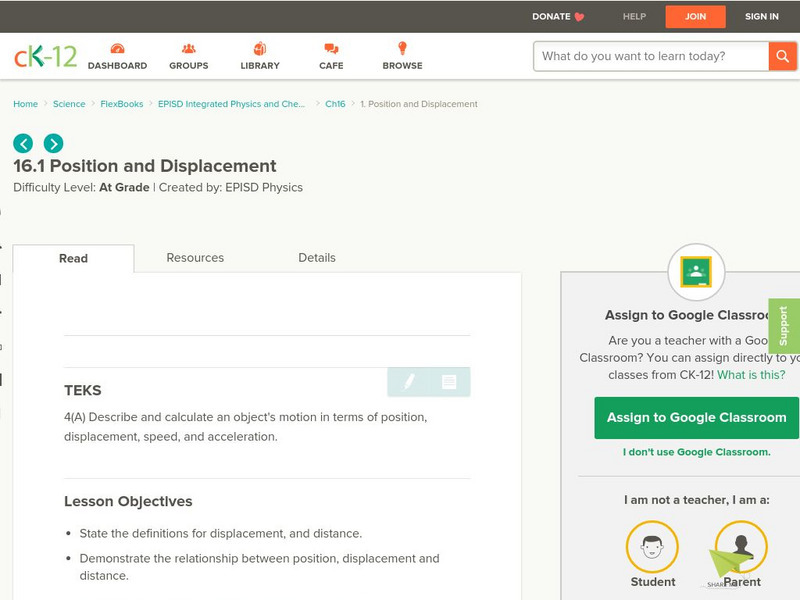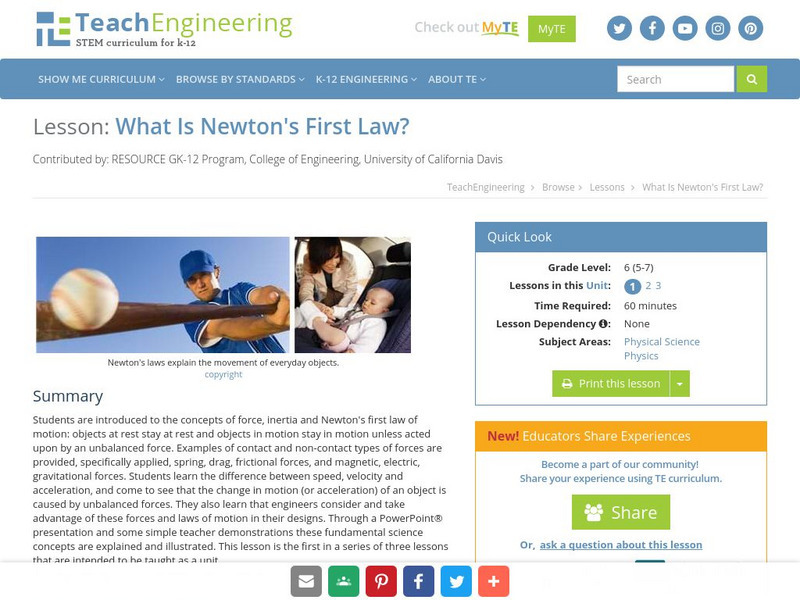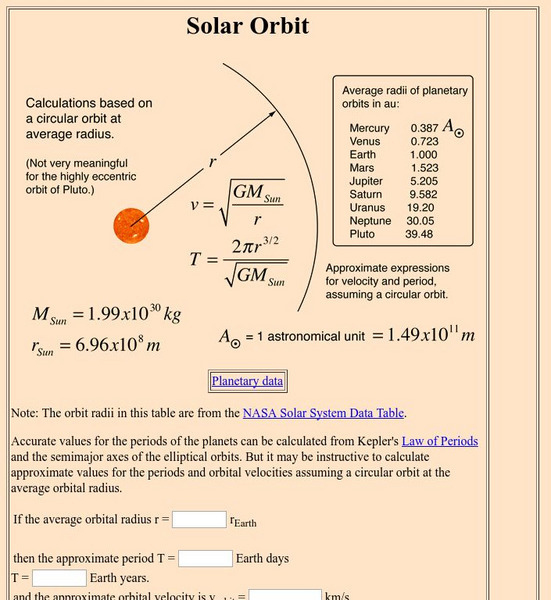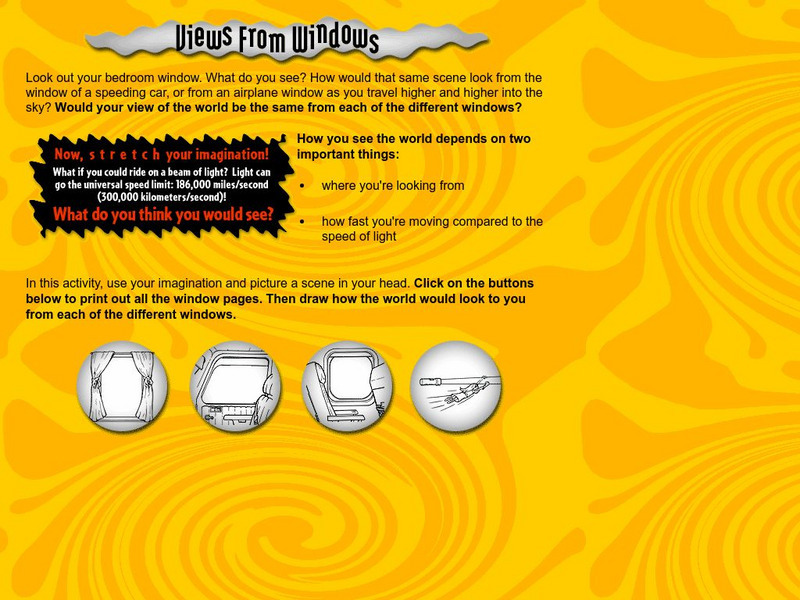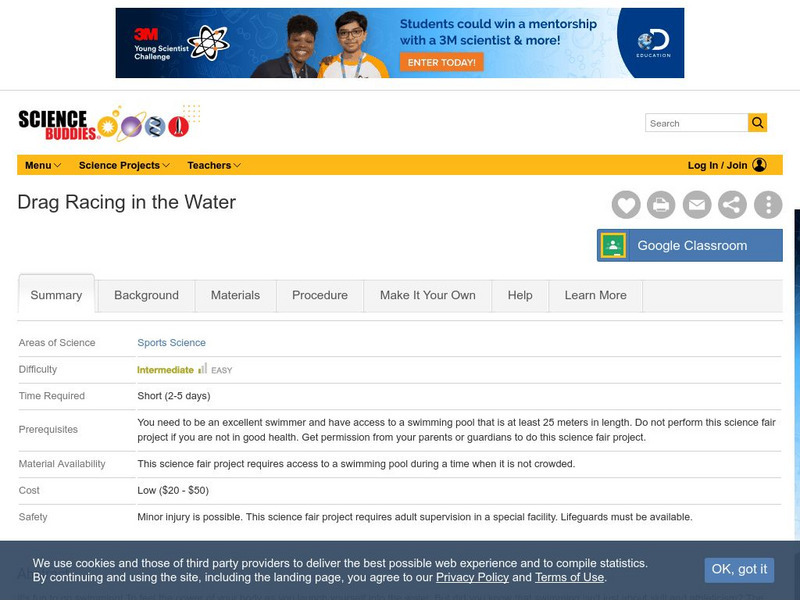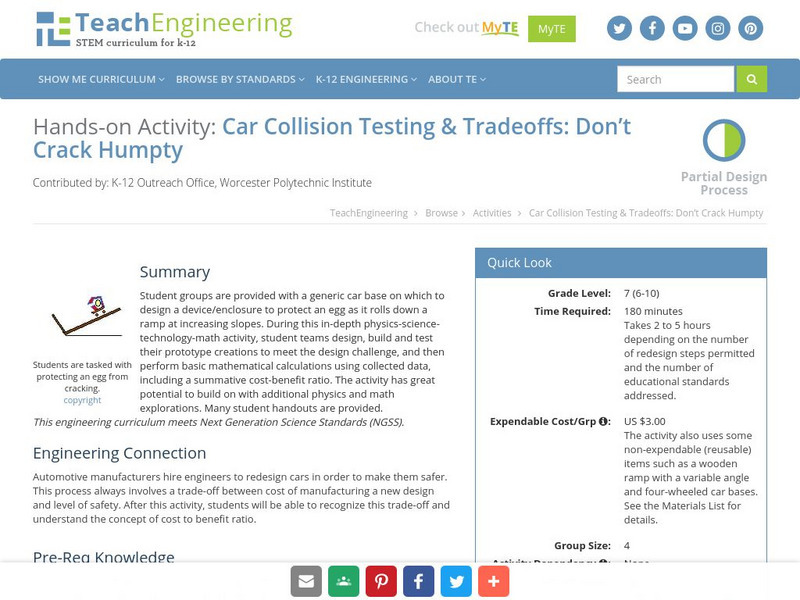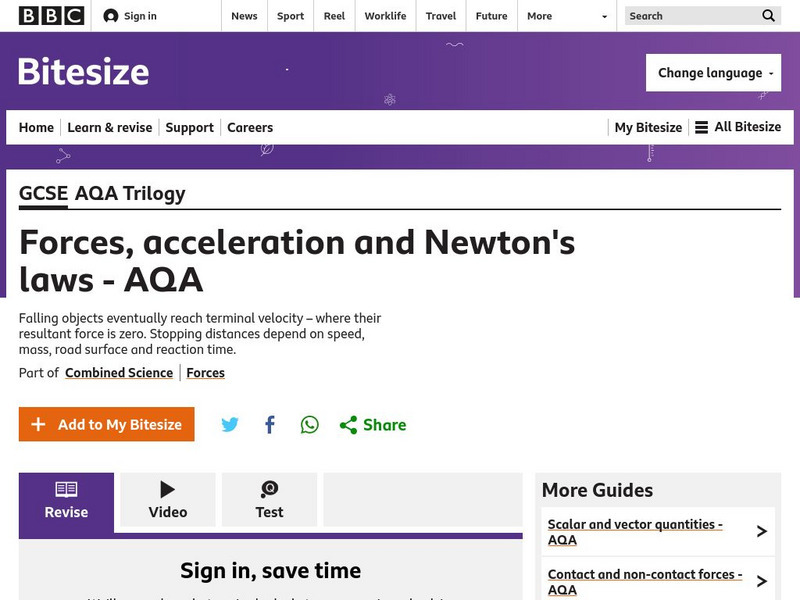CK-12 Foundation
Ck 12: Position and Displacement
[Free Registration/Login may be required to access all resource tools.] Students explore and calculate an object's motion in terms of position, displacement, speed, and acceleration.
TeachEngineering
Teach Engineering: What Is Newton's First Law?
Students are introduced to the concepts of force, inertia, and Newton's first law of motion: objects at rest stay at rest and objects in motion stay in motion unless acted upon by an unbalanced force.This lesson is the first in a series...
Utah Education Network
Uen: Rollin' On
Activity shows how gravity affects the motion of an object rolling up or down a hill.
Utah Education Network
Uen: May the Best Force Win
The greater the force applied to an object, the greater the change in speed or direction of the object.
American Chemical Society
Middle School Chemistry: Lesson Plans: Does Temperature Affect Dissolving?
Students identify and control variables to design an experiment to see whether the temperature of a solvent affects the speed at which a solute dissolves.
CK-12 Foundation
Ck 12 Exploration Series: Simulations: Physics: Archery
[Free Registration/Login Required] Watch this animation as an archer shoots at a target on an angle, and its horizontal and vertical paths and its velocity are explained. An interactive follows where you can manipulate the archer's...
TryEngineering
Try Engineering: Measuring the Wind
Young scholars explore the design of anemometers and how they are used in measuring the speed of wind. Working in teams of "engineers", they will design, build, and evaluate the effectiveness of their own anemometers, presenting their...
Better Lesson
Better Lesson: Falling Objects
Learners will determine if objects fall at the same speed by testing a variety of objects as they let them fall from above. They will learn that gravity is the force that is pulling on the object. Included in this lesson is a video about...
Other
Bc Open Textbooks: Energy and the Simple Harmonic Oscillator
This resource examines how to determine the maximum speed of an oscillating system. It discusses how the concept of law of energy can be applied in solving these types of problems.
Georgia State University
Georgia State University: Hyper Physics: Solar Orbit
A table listing the average radius of orbit for the nine planets about the sun; expressed in astronomical units. Data can be used to calculate the orbital speed or the orbital period.
American Museum of Natural History
American Museum of Natural History: O Logy: Stuff to Do: Views From Windows
Instructions that take you through an Einstein-like thought experiment by having you imagine and record what you see when stationary and when moving at the speed of light.
Other
Calculus Preview
The resource gives students a preview of topics learned in Calculus. Concepts included are graphs, speed, and integration. Graphs, tables, and an interactive applet are used to investigate the examples.
CK-12 Foundation
Ck 12 Exploration Series: Simulations: Physics: Butterfly Stroke
[Free Registration/Login Required] Learn about the relationship between velocity and position for a swimmer. Adjust the velocity of the legs, streamline, and arms to experiment with the slope of velocity in the simulation swimmer. Dig a...
CK-12 Foundation
Ck 12 Exploration Series: Simulations: Physics: Model Rocket
[Free Registration/Login Required] Learn about the relationship between position and velocity for a model rocket during launch and in free-fall. Experiment with rocket mass, rocket thrust, and rocket burn time to understand the...
Science Buddies
Science Buddies: Drag Racing in the Water
It's fun to go swimming. To feel the power of your body as you launch yourself into the water. But did you know that swimming isn't just about skill and athleticism? The human body consists of skin, contours, and curves. How the water...
Better Lesson
Better Lesson: A Change of Direction Exploring the Impact of Forces
Learners will be able to determine a way to change the direction of a moving object by conducting a simple experiment. Included in this lesson are videos of the activity in action, a printable recording sheet, pictures of the set-up for...
CK-12 Foundation
Ck 12 Exploration Series: Simulations: Physics: Stow Lake
[Free Registration/Login Required] Learn about the patterns of wave interference in water in this simulation.
TeachEngineering
Teach Engineering: Car Collision Testing & Tradeoffs: Don't Crack Humpty
Student groups are provided with a generic car base on which to design a device/enclosure to protect an egg as it rolls down a ramp at increasing slopes. During this activity, student teams design, build and test their prototype...
Texas Instruments
Texas Instruments: Shape Up!
In this activity, students can use the motion detector to record motion, and observe how the direction of movement, speed of travel, and the rate of change of direction and speed affect the shape of a distance-time plot.
Texas Instruments
Texas Instruments: Vernier a Speedy Slide With Easy Data App and Cbr 2
Students can use a CBR 2 motion detector to determine their speed or velocity going down a playground slide. They will also experiment with different ways to increase their speed going down the slide.
Science Struck
Science Struck: Kinetic Energy Formula
Explains what is meant by kinetic energy and demonstrates how to use the formulas for a point mass moving at less than the speed of light, for rotational motion, and for a mass moving at a relativistic speed. Includes interactive...
Texas Instruments
Texas Instruments: Match Me!
In this activity, students move in a specific way in front of the motion detector to create motion plots that match a given Distance versus Time plot. They make connections between types of movements and characteristics of Distance-Time...
Georgia State University
Georgia State University: Hyper Physics: Earth Orbit Velocity
A discussion and statement of an equation for orbital speed. An interactive JavaScript form allows the user to investigate the relationship between orbital height and orbital speed. A very good opportunity to practice and receive...
BBC
Bbc: Gcse Bitesize: Forces, Acceleration and Newton's Laws Aqa
This lesson focuses on Newton's First Law: an object remains in the same state of motion unless a resultant force acts on it. If the resultant force on an object is zero, this means: a stationary object stays stationary; a moving object...
Other popular searches
- Speed and Motion
- Forces and Motion Speed
- Motion Speed and Velocity
- Force Motion Friction Speed
- Motion Speed and Distance
- Motion, Speed and Distance
- Speed Velocity Motion
- Describing Motion Speed
- Motion and Speed Labs
- Slow Speed Motion
- Speed and Motion Graphs
- Motion and Speed Lessons


